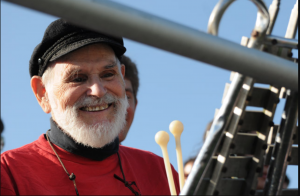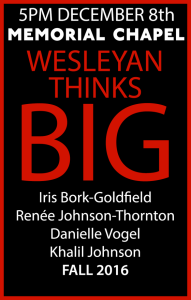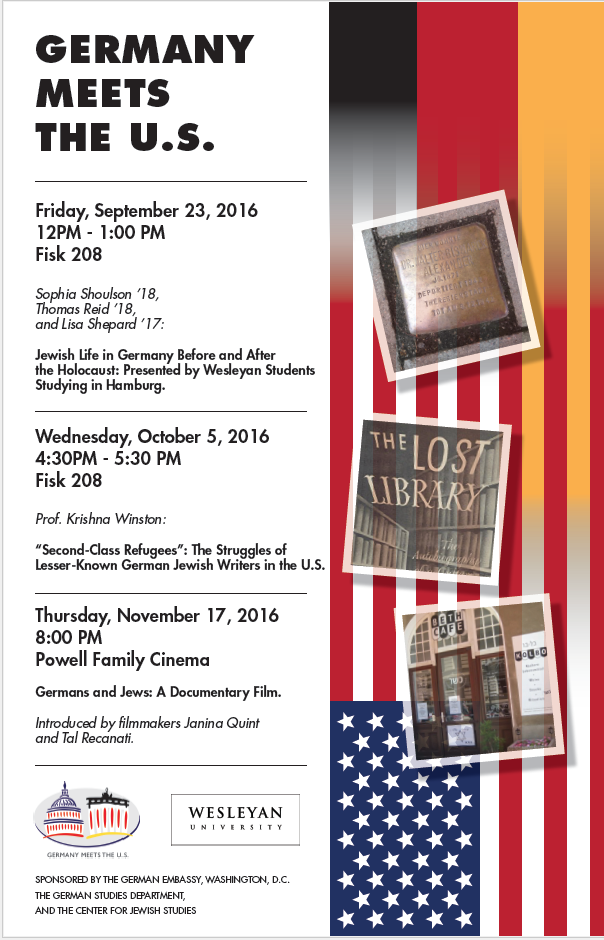Faculty News
Career Day: Studying and Working in Germany
Representatives of German business, universities and foundations will inform about study and career opportunities with German and in Germany.
For more information, go to Career Booster Germany.
With great sadness we share this news
Our colleague and friend Peter M. Frenzel, Marcus L. Taft Professor of German Studies, Emeritus, passed away on Sunday, May 20, 2018, at the age of 82.

Peter arrived at Wesleyan in 1966 after receiving his B.A. from Yale, M.A. from Middlebury, and Ph.D. from the University of Michigan. He retired in 2003 after 37 years at Wesleyan. During his time here, Peter served on virtually every major committee, including Advisory and EPC, and he served in a number of administrative roles, including as an Associate Provost, Dean of Arts and Humanities, chair of German Studies, director of the Wesleyan Program in Germany, and as the Commencement Marshal. In his retirement, Peter served on the Advisory Board for the Wasch Center for Retired Faculty and was editor of the Center’s newsletter. He was a carillonneur who oversaw Wesleyan’s carillon bells, and he played the glockenspiel with the pep band during football games.
Peter was one of the foremost experts on the German Minnesang tradition of lyric- and song-writing, with particular expertise in the early forms of Medieval German literature and the connection between poetry and music. His scholarship on medieval music and literature and German music and culture of the 19th century contributed much to our knowledge of the Middle Ages.
His colleague Herb Arnold said, “Peter loved music in its more modern expression, as well, often sitting down at his piano for an impromptu riff or chasing the perfect Wagner Ring around the globe, visiting what seems like every operatic venue from New York to Sydney.”
Peter is survived by his wife, Laurie Neville Frenzel; grandchildren John Frenzel and Rita Frenzel; daughter Kim Frenzel and partner John Lucey; and his older brother, Robert. A memorial gathering will be held at the Wadsworth Mansion from 1:30 to 4 p.m. on Sunday, June 17, 2018. Memorial contributions can be made to the Cystic Fibrosis Foundation, P.O. Box 97372, Washington, D.C. 20090-7372, or to the Susan and William Wasch Center for Retired Faculty, c/o Jessie Steele, 51 Lawn Avenue, Middletown, CT 06457.
Bork-Goldfield Elected to American Association of Teachers of German Council
Iris Bork-Goldfield, chair and adjunct professor of German studies, has been elected to serve as the Northeast Region representative to the Executive Council of the American Association of Teachers of German.
The American Association of Teachers of German (AATG) supports the teaching of the German language and German-speaking cultures in elementary, secondary, and post-secondary education in the United States. The AATG promotes the study of the German-speaking world in all its linguistic, cultural and ethnic diversity, and endeavors to prepare students as transnational, transcultural learners and active, multilingual participants in a globalized world.
Bork-Goldfield will act as an as ambassador and advocate for the AATG to both the association’s members and to external constituents; serve on one or more committees as appointed by the president; attend committee meetings; discuss meeting agenda items as necessary with key leaders in her region prior to meetings; and keep abreast of emerging professional issues.
In November, Bork-Goldfield will attend the AATG / American Council on the Teaching of Foreign Languages Annual Convention and World Languages Expo in Nashville, Tenn. There, she will participate in two days of meetings and participate in the assembly of chapter presidents.
Bork-Goldfield has already served as president of the Connecticut AATG chapter and is a long-time member of the chapter’s executive committee.
“Iris’s election provides evidence of the support and respect she enjoys among AATG members for her many valuable contributions to teaching the German language and culture,” said Wesleyan colleague and Connecticut AATG executive committee member Krishna Winston, the Marcus L. Taft Professor of German Language and Literature.
At Wesleyan, Bork-Goldfield teaches German language, literature, and culture courses at all levels. Born and educated in Germany, Bork-Goldfield has lived and worked in China, England and Israel. She is the recipient of the Rosenbaum-Anderson Award for Teaching in 2009 and has received research grants from the German government, German Embassy and Wesleyan.
by Olivia Drake
German Studies Faculty News
Krishna Winston
Krishna Winston translated three early screenplays by Werner Herzog (Signs of Life, Even Dwarfs Started Small, and Fata Morgana) for the first of two volumes she is translating for the University of Minnesota Press.
Uli Plass
At the University of Potsdam, Ulrich Plass lectured on debates over literary realism from the 19h century to the present and led a workshop on the same theme. At the ACLA conference in Utrecht, he presented a paper on the mediations of social and aesthetic form in Schiller, Lukacs, and Adorno. He also wrote an article on liberalism, neoliberalism, and the literary representation of economic inequality for a forthcoming essay collection on literature and economics.
Martin Bäumel
Martin Bäumel’s chapter entitled “Cognitio poetica – Rational and Sensate Cognition in Hagedorn’s Poetry,” was accepted for inclusion in a collection of papers from the 2013 GSA Seminar “For a New Enlightenment,” ed. by Hans Adler and Rüdiger Campe, Random House.
Iris Bork-Goldfield
Iris Bork-Goldfield’s book Wir wollten was tun, published by Metropol in 2015 was reviewed in the German Studies Review, Vol. 40, No. 2, 2017. Her teaching materials for her book and documentary film were accepted for publication for a digital textbook to be published by EDUVERSUM, Wiesbaden, Germany.
Krishna Winston receives the Order of Merit
 The German Consul General will bestow the Order of Merit to Professor Krishna Winston on Monday, February 13. The Order of Merit, in Germany also referred to as the Bundesverdienstkreuz, was instituted by Federal President Theodor Heuss in 1951. It is the highest tribute the Federal Republic of Germany pays to individuals for services to the nation or contributions to enhancing Germany’s standing abroad and its relations with other countries. The Order of Merit may be awarded to Germans as well as to foreign citizens for achievements in the political, economic, social, or intellectual spheres and for outstanding service to the nation in the field of social, charitable, or philanthropic work. In awarding the Order of Merit, the Federal President wishes to draw public attention to achievements that he believes are of particular value to society in general. Krishna Winston will receive this honor for her excellent translations, her work with Fulbright, the German Exchange Board (DAAD), and the Baden-Württemberg exchange as well as for her advancing the role of German language and culture in the U.S. for many years.
The German Consul General will bestow the Order of Merit to Professor Krishna Winston on Monday, February 13. The Order of Merit, in Germany also referred to as the Bundesverdienstkreuz, was instituted by Federal President Theodor Heuss in 1951. It is the highest tribute the Federal Republic of Germany pays to individuals for services to the nation or contributions to enhancing Germany’s standing abroad and its relations with other countries. The Order of Merit may be awarded to Germans as well as to foreign citizens for achievements in the political, economic, social, or intellectual spheres and for outstanding service to the nation in the field of social, charitable, or philanthropic work. In awarding the Order of Merit, the Federal President wishes to draw public attention to achievements that he believes are of particular value to society in general. Krishna Winston will receive this honor for her excellent translations, her work with Fulbright, the German Exchange Board (DAAD), and the Baden-Württemberg exchange as well as for her advancing the role of German language and culture in the U.S. for many years.
Laudatio given by Mr. Ralf Horlemann, Consul General of the Federal Republic of Germany on February 13, 2017 at Wesleyan University.
Handke’s Moravian Night translated by Krishna Winston
Krishna Winston, the Marcus L. Taft Professor of German Language and Literature, translated The  Moravian Night: A Story by German novelist Peter Handke. The American translation was published in December 2016 by Farrar, Straus and Giroux, New York.
Moravian Night: A Story by German novelist Peter Handke. The American translation was published in December 2016 by Farrar, Straus and Giroux, New York.
Reviews of the translation have appeared in The New York Times, the New York Review of Books, and Kirkus.
Win ston specializes in literary translation and has translated more than 35 works of fiction and non-fiction from Handke, Johann Wolfgang von Goethe, Günter Grass, Christoph Hein, Golo Mann, Rainer Werner Fassbinder and Hans Jonas. Her translations make available to the entire English-speaking world works originally written in German, and she has received three major literary prizes for her translations. She also was awarded the The Order of Merit of the Federal Republic of Germany, the Bundesverdienstkreuz, by the President of the Federal Republic of Germany.
ston specializes in literary translation and has translated more than 35 works of fiction and non-fiction from Handke, Johann Wolfgang von Goethe, Günter Grass, Christoph Hein, Golo Mann, Rainer Werner Fassbinder and Hans Jonas. Her translations make available to the entire English-speaking world works originally written in German, and she has received three major literary prizes for her translations. She also was awarded the The Order of Merit of the Federal Republic of Germany, the Bundesverdienstkreuz, by the President of the Federal Republic of Germany.
The Moravian Night, as summarized by the book’s publisher, explores the mind and memory of an aging writer, tracking the anxieties, angers, fears, and pleasures of a life inseparable from the recent history of Central Europe.
Mysteriously summoned to a houseboat on the Morava River, a few friends, associates, and collaborators of an old writer listen as he tells a story that will last until dawn: the tale of the once well-known writer’s recent odyssey across Europe. As his story unfolds, it visits places that represent stages of the narrator’s and the continent’s past, many now lost or irrecoverably changed through war, death and the subtler erosions of time. His story and its telling are haunted by a beautiful stranger, a woman who has a preternatural hold over the writer and appears sometimes as a demon, sometimes as the longed-for destination of his travels.
by Olivia Drake
Thank you for Smoking. The Unintended Consequences of Lucky Strikes
 On Dec. 8, Wesleyan will hold Wesleyan Thinks Big, a biannual TED-talk style event featuring Wesleyan faculty and administrators giving 10-minute speeches on an experience, a personal passion, an existential question or another topic of their choosing. The event will take place at 5 p.m. in Memorial Chapel.
On Dec. 8, Wesleyan will hold Wesleyan Thinks Big, a biannual TED-talk style event featuring Wesleyan faculty and administrators giving 10-minute speeches on an experience, a personal passion, an existential question or another topic of their choosing. The event will take place at 5 p.m. in Memorial Chapel.
This year’s event is being coordinated by Catherine Wulff ’18, with help from Rachel Godfrey ’19 and Kaiyana Cervera ’19.
“Wesleyan Thinks Big is a way to bring the community together outside of the classroom, by shedding light on the strength of personal testimony and human connection,” said Wulff. “Our main goal is for the audience to leave energized and hopeful.”
Wesleyan Thinks Big will feature:
- Iris Bork-Goldfield, adjunct professor of German studies and chair of the German Studies Department: “Thank you for Smoking. The Unintended Consequences of Lucky Strikes;”
- Danielle Vogel, visiting assistant professor of creative writing in English: “Narrative & Nest;”
- Renee Johnson-Thornton, dean for the Class of 2018: “How to Excel in College by Cultivating Membership in a Community of Practice;” and
- Khalil Johnson, assistant professor of African American studies: “Settler Colonial Blues: Musings from the Margins of Black and Indigenous History.”
by Laurie Kenney • December 5, 2016
“Second Class Refugees”: The Struggles of Lesser-Known German Jewish Writers in the U.S.
xxxxx
Professor Krishna Winston’s talk “Second Class Refugees”: The Struggles of Lesser-Known German Jewish Writers in the U.S. is the second event in our series “Germany Meets the U.S.” and will take place Wednesday, October 5th, from 4:30-5:30 p.m., in Fisk 208. Refreshments will be served.
Professor Winston will talk about German Jewish writers who had been quite well known in Germany but who struggled to establish themselves professionally when they emigrated to the U.S. and thus endured great economic and emotional hardship. Among them are Mehring, Hans Sahl, Curt Riess, and Heinrich Eduard Jacob. Her parents, the distinguished translators Richard and Clara Winston, knew these authors personally and translated their works into English. Krishna will draw on her collection of letters exchanged between these refugees and her parents as well as on her own memories.
Jewish Life in Germany Before and After the Holocaust
xxxxx
xxxxxxx
We launch our series “Germany Meets the U.S.” next Friday, Sept. 23 in Fisk 208 from 12-1:00PM. There will be three short presentations on Jewish Life in Germany Before and After the Holocaust.
Thomas Reid ’18: Jewish and Christian Faith in Dialogue. Religious Thought in Germany in the Shadow of the Holocaust.
Sophia Shoulson ’18: The Jewish History that I Didn’t Learn in Day School. Personal Reflections on a Semester in Germany.
Lisa Shepard ’17: “Was bist du denn?” Reflections of a Mixed Identity in Germany. (“So what are you then?”)
All three students spent a semester in Hamburg, Germany. Please announce this event to your students. Lunch will be served.
Wesleyan Students arrived in Hamburg, Germany

From left to right: Sophia, Lisa, Thomas, Frau Bork, Jack, Hannah
Smith in Hamburg
Full-year or spring only. The language requirement for the full-year program is GRST 214 or the equivalent. For the spring semester only, we require GRST 211 or the equivalent. Students will be able to take courses at Hamburg University and the Technical University. Please contact the German Studies faculty for more information.
Professor Bork-Goldfield presents her book in Potsdam, Germany
Mi 17.06.2015 | 19:30 | Brandenburg aktuell
–
1950 gründeten in Wer der Lehrlinge, Schüler und Studenten eine antistalinistische Widerstandgruppe. Sie verteilten Zettel gegen die ersten Wahlen zur Volkskammer. Sieben von ihnen wurden verhaftet und zum Tode verurteilt. Werner Bork floh in den Westen. Nun stellt er sein Buch über den Widerstand vor.
der Lehrlinge, Schüler und Studenten eine antistalinistische Widerstandgruppe. Sie verteilten Zettel gegen die ersten Wahlen zur Volkskammer. Sieben von ihnen wurden verhaftet und zum Tode verurteilt. Werner Bork floh in den Westen. Nun stellt er sein Buch über den Widerstand vor.
Brandenburg aktuell hat ihn bei einem Besuch in Werder getroffen.
In den POTSDAMER NACHRICHTEN heißt es, Werner Bork sei “ein ernstzunehmender Gegner”.








![Gunter Grass CUNY Event [1]](https://german.site.wesleyan.edu/files/2015/04/Gunter-Grass-CUNY-Event-11-791x1024.jpg)